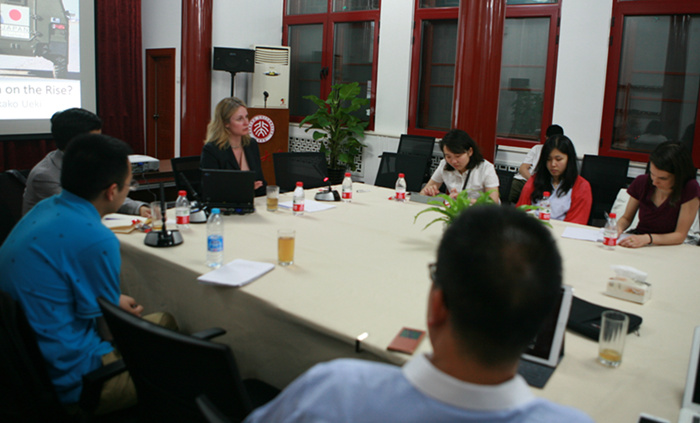
On May 23, 2016, the Institute of International & Strategic Studies (IISS), Peking University (PKU) held a new seminar of the "North Pavilion Seminar", featuring a keynote lecture from Dr. Jennifer Lind, Associate Professor in the Department of Government, Dartmouth College, on the topic of "is nationalism on the rise in Japan". The seminar was hosted by Associate Prof. Gui Yongtao, Assistant President of IISS. Prof. Yu Tiejun, Vice President of IISS, as well as lecturers of the School of International Studies (SIS), PKU, attended the seminar.
Dr. Lind first suggested that the concept of "nationalism" is very complex. So far there is no clear definition on the concept, and if controversy exists in the concept, it's not realistic to have further theoretical discussion on it. Based on the research paper on nationalism co-authored by Dr. Lind and her colleague at Waseda University, Dr. Lind pointed out that if you want to study whether the country's nationalism is on the rise, you need not only to track situation in the country for a long period, but to compare it with other countries.
Dr. Lind held that nationalism has two aspects, one is the national identity, and the other is assertiveness. In her view, the former mainly includes the following indicators: the frequency of paying homage to the Yasukuni Shrine and the public opinions on it, polls related to identity and patriotism and the prime minister's speech delivered on the day the war ended etc. The latter includes: system restrictions on defense, defense's share in GDP, military deployment overseas and the public's views on the use of force etc.
If we examine the situation with above indicators, how can we answer the question of "is nationalism on the rise in Japan"? Dr. Lind took three steps.
First, we need to answer, is Japan becoming more nationalistic? The answer is no. Results of the study show that Japan has not only become more cosmopolitan over time, but is considered one of the most tolerant countries in the world when being compared with other countries.
Second, we need to answer, is Japan becoming more confident? The answer is yes. This can be concluded from Japan's ease of restriction on its defense regulations and its deployment of more Japan Self-Defense Force overseas.
Finally, we need to answer, compared with other countries, is Japan more stubborn? Dr. Lind's collaborative research doesn't give firm conclusions on this question.
In view of this, nationalism in Japan and its rise still need further exploration. At the seminar, Dr. Lind also answered audience’s questions, such as postmodern nationalism in Japan, opinion gap between leaders and the public, the U.S.'s role in China-Japan relations, disputes in research on relevant topics in the U.S., young people's indifference to politics in Japan and orientation and public opinion shaping of the mass media etc.

